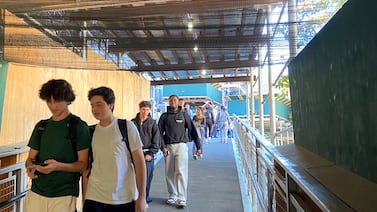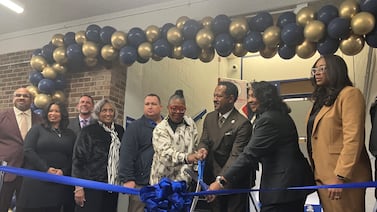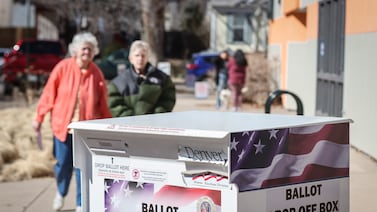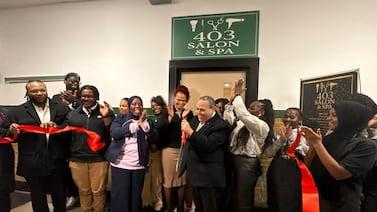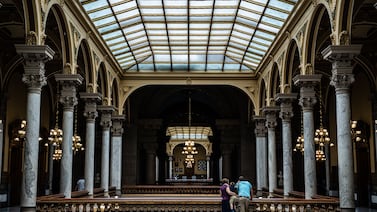Sign up for Chalkbeat Indiana’s free daily newsletter to keep up with Indianapolis Public Schools, Marion County’s township districts, and statewide education news.
Doreen Waldbieser, a school counselor in Vigo County, stepped to the microphone Nov. 8 at a Department of Education hearing on diplomas and began alphabetically listing her counseling duties:
Attend active shooter training. Analyze transcripts. Answer emails and phone calls.
Change schedules. Conduct screenings. Connect students to assistance.
She didn’t get past the M’s before her speaking time ran out.
Her point to policymakers was that even before the state’s new graduation requirements take effect, Indiana’s school counselors are already stretched too thin.
A new report on the profession in Indiana found that many counselors agree.
Student mental health needs are consistently higher since the pandemic and school counselors say they have less time to spend with students, according to the 2024-25 Indiana School Counselor Survey. To blame, they said, are growing lists of tasks like test and attendance monitoring and higher-than-average caseloads — Indiana has one counselor for every 351 students, higher than the recommended ratio of 1-to-250.
As lawmakers prepare to meet for the 2025 legislative session, they’re poised to again consider a proposal requiring counselors spend at least 60% of their time working with students. Other suggestions from counselors include putting the nationally recommended ratio into law, or funding more pipeline programs for teachers to earn counseling degrees. In a budget year, lawmakers could consider funding proposals, but already face a laundry list of K-12 education priorities.
Senate Bill 141, sponsored by Oldenburg Republican Sen. Jean Leising in 2024, set a threshold of 60% and then 85% the year after, but the bill didn’t make it through the House. Leising said she intends to bring the proposal forward again next year.
Counselors in the survey said it’s critical that their roles and responsibilities are defined so that they are not “on call for just about anything that needs to be done.”
“Administrators are protective of teacher time and focus on teaching students, but no one is protective of the school counselor role,” one counselor said. “We are expected to be masters of all areas and it just isn’t possible.”
More counselor tasks means less time with students
Today’s high schoolers were in middle school when the pandemic closed school buildings, and they spent a pivotal time in their development in isolation, said Ryan Preci, board chair for the Indiana School Counselors Association and high school counselor coordinator with Indianapolis Public Schools.
The result is an ongoing increase in student mental health needs as noted in the last several years of the counseling survey. This year, more than half of all counselors said that students’ social-emotional needs are higher this school year than last.
“COVID did increase mental health needs but it also shone a light on what was always there,” Preci said.
Simultaneously, counselors’ perception that they have enough time to meet with students has dropped to its lowest level since the survey began in 2011.
On average, counselors this year spent around 69% of their time providing a mix of direct services, like meeting face-to-face with students, and indirect counseling services, like parent and teacher conferences. Another 16% was spent on program management, and 15% was spent on non-counseling duties, which include test proctoring and arrival and dismissal duties.
Preci said counselors’ focus should be in three domains: Academics, social-emotional support, and college and career readiness. National recommendations say counselors should spend around 80% of their time on direct and indirect counseling services.
The upcoming changes to Indiana’s graduation requirements could place even more clerical work on counselors’ plates, Waldbieser, the Vigo schools counselor, told the state education board.
With three new proposed diploma seals, each with two levels, counselors will be responsible for individualizing graduation plans, along with verifying students’ work hours and college-level courses, and facilitating the Armed Services Vocational Aptitude Battery (ASVAB) test.
It’s not yet clear what other changes lawmakers may make. A bill last year would have allowed chaplains to work as school counselors in public schools, providing only secular guidance unless the student’s parent gave permission for nonsecular guidance. The proposal was dropped in Indiana, but has passed in states like Texas.
School leaders’ support for counselors has grown significantly, according to the report, after hitting a low in 2021-22.
Preci said he’d like to see lawmakers put the recommended counselor-to-student ratio into law. Also helpful would be more programs to help teachers earn master’s degrees in counseling in order to make the switch from teaching to counseling.
“We need to fully fund public education in order to do that, in order to provide those services,” Preci said.
Aleksandra Appleton covers Indiana education policy and writes about K-12 schools across the state. Contact her at aappleton@chalkbeat.org.



